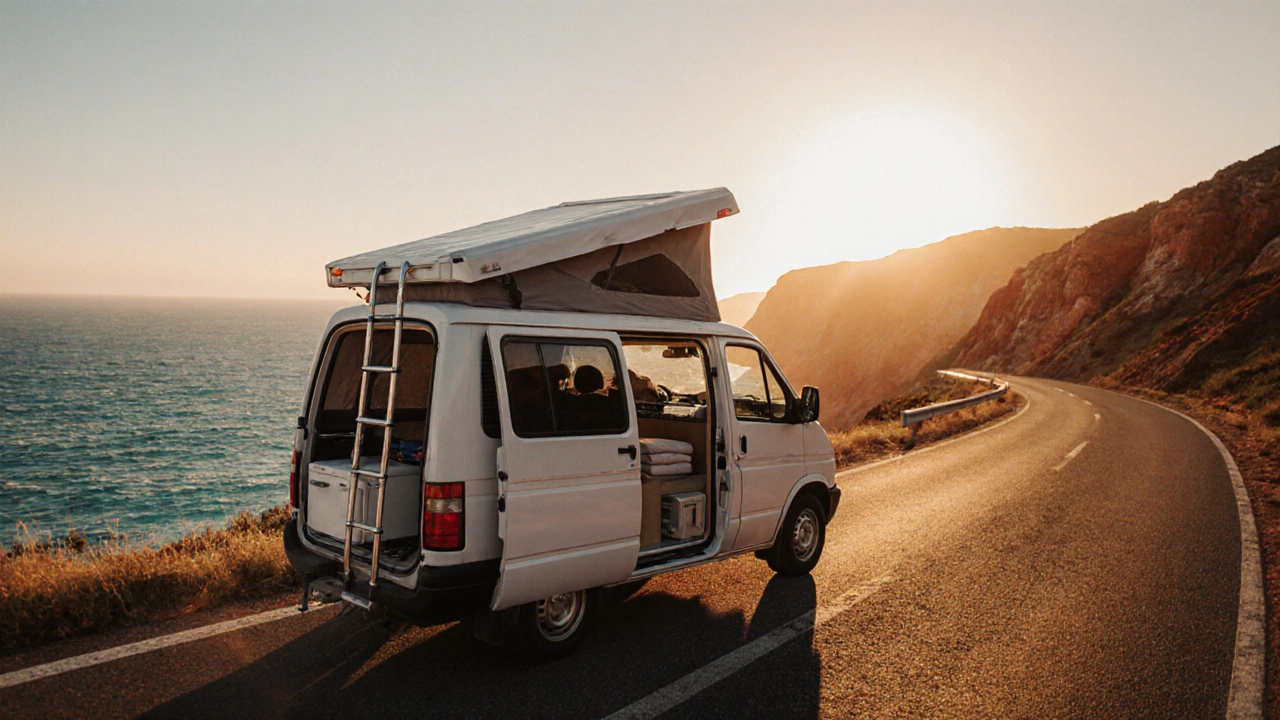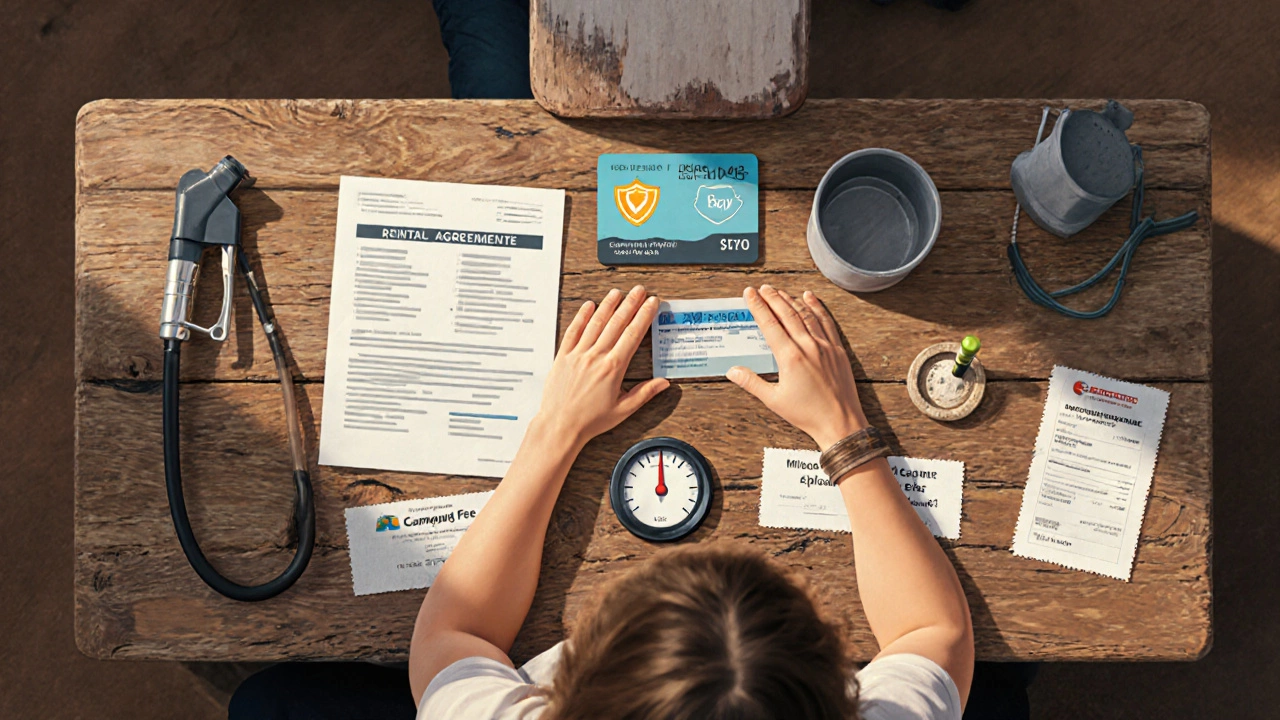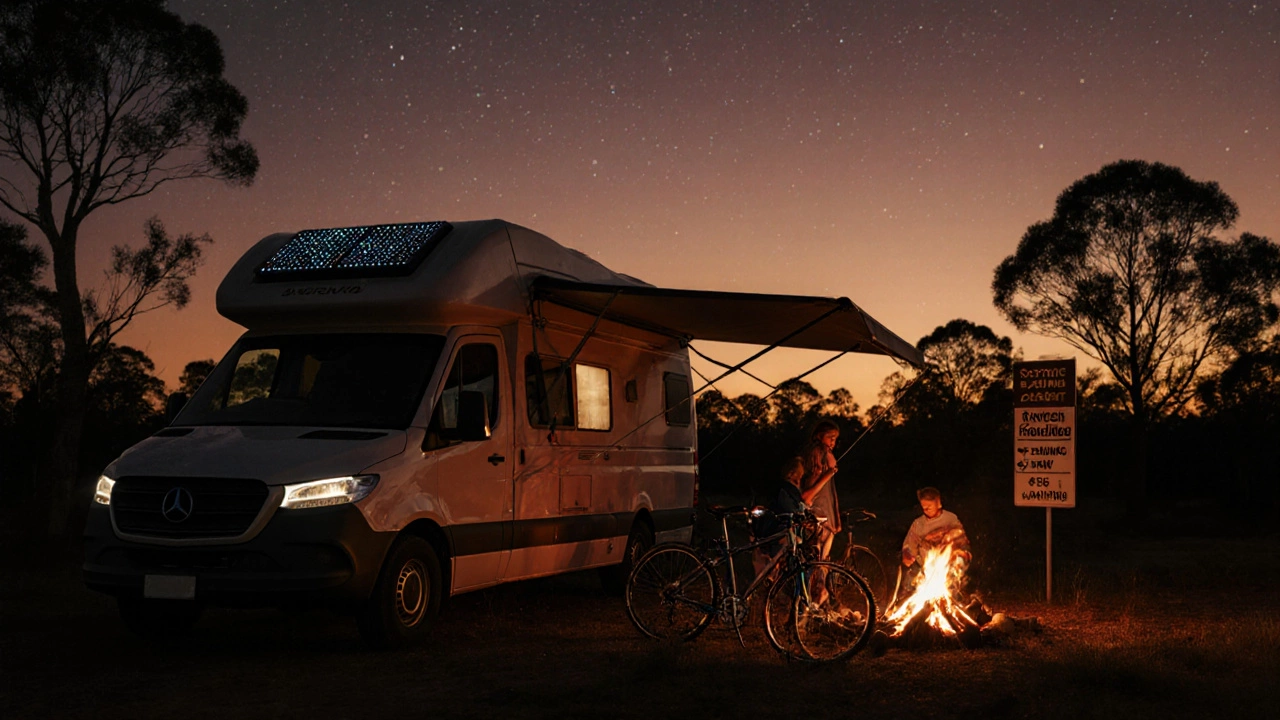Camper Van Rental Cost Guide: How Much Should You Spend?
 Oct, 23 2025
Oct, 23 2025
Camper Van Cost Calculator
Estimate Your Camper Van Costs
Estimated Costs
When planning a road trip, camper van hire is the practice of renting a self‑contained vehicle that provides both transport and sleeping quarters, perfect for exploring Australia’s diverse landscapes. The big question most people face is: camper van hire cost-how much should you actually spend?
Break down the cost components
Understanding where the money goes makes it easier to set a realistic budget. Below are the main line items you’ll see on any quote:
- Base rental rate - usually quoted per day or per week. This covers the vehicle itself and basic equipment like a fridge, stove, and bedding.
- Fuel consumption - camper vans are heavier than a normal car, so they sip more fuel. Expect between 10‑12 L/100km for a standard model and 8‑9 L/100km for a 4WD camper.
- Insurance - most hire companies include third‑party cover, but you may need extra excess waiver or personal accident cover. Prices range from $10‑$30 per day.
- Mileage limit - many rentals include a free kilometre allowance (e.g., 300 km/week). Anything above that incurs a per‑kilometre charge, typically $0.30‑$0.45.
- Campsite fees - not part of the hire price, but you’ll pay $15‑$45 per night at most caravan parks. Remote wild camping spots may be free.
- Cleaning & maintenance - a small refundable deposit (often $100‑$200) covers any extra cleaning or wear and tear.
Set a realistic daily and weekly budget
In 2025 the Australian market shows three clear price bands:
- Budget - $80‑$120 per day. Typically a compact van built on a sedan chassis.
- Mid‑range - $130‑$180 per day. More living space, better insulation, and optional 4WD.
- Luxury - $200‑$350+ per day. High‑end amenities, solar panels, and premium interiors.
Weekly discounts are common: a 7‑day hire often drops the daily rate by 10‑15 %. For a two‑week adventure, factor in a 20 % discount on the base rate.
Factors that push the price up or down
Not every trip is the same, so adapt the numbers to your situation:
- Seasonality - peak summer (Dec‑Feb) and school holidays can add 20‑30 % to rates. Off‑peak (May‑Aug) sees the best deals.
- Location - hiring from a major hub like Perth is usually cheaper than from coastal tourist hot spots such as Sydney or Melbourne.
- Vehicle type - a basic interior model is the cheapest; adding a pop‑up roof, solar setup, or upgraded kitchen bumps the price.
- Insurance choices - opting for a low‑excess policy reduces unexpected out‑of‑pocket costs but raises the daily fee.
- Mileage needs - planning a long cross‑country trek (e.g., from Perth to Cairns) may require buying unlimited kilometres, adding $50‑$100 per week.

Comparison of typical rental packages
| Feature | Budget | Mid‑range | Luxury |
|---|---|---|---|
| Daily rate (AUD) | $95 | $155 | $275 |
| Fuel consumption (L/100km) | 11.5 | 10.0 | 9.0 |
| Included km per week | 300 km | 400 km | Unlimited |
| Insurance (per day) | $12 | $20 | $30 |
| Sleeping capacity | 2 persons | 2‑4 persons | 4‑6 persons |
| Extras (solar, bike rack) | None | $10‑$20 per day | Included |
Tips to keep the total spend low
Even if you’re eyeing a mid‑range model, a few smart moves can shave $200‑$500 off a two‑week trip:
- Book early. Rates drop 10‑15 % when you lock in a reservation 8‑12 weeks ahead.
- Choose off‑peak weeks. Mid‑May or late August usually have the lowest daily fees.
- Limit extra kilometres. Plan your itinerary to stay within the free km allowance; when you must exceed, buy a kilometre pack upfront.
- Refuel wisely. Fill up at larger service stations where price per litre is lower, and keep the tank near half when parked overnight to avoid fuel‑pump wear.
- Self‑clean. Many hire firms waive the cleaning deposit if you return the van tidy and empty the waste tanks.
- Use free wild camping spots. In Western Australia, you can legally stay up to 14 nights on free land if you follow the local guidelines.

Sample budgets for common trip styles
Below are three typical scenarios. All figures are in Australian dollars and assume a 14‑day trip.
- Solo adventure - budget
- Base rate (budget van): 14 days × $95 = $1,330
- Fuel (1,400 km × 11.5 L/100 km × $1.70/L): ≈ $274
- Insurance: 14 × $12 = $168
- Campsite fees (8 nights × $20): $160
- Extra: food, activities ≈ $400
- Total ≈ $2,332
- Couple getaway - mid‑range
- Base rate: 14 × $155 = $2,170
- Fuel (2,000 km × 10 L/100 km × $1.70): $340
- Insurance: 14 × $20 = $280
- Campsite fees (10 nights × $30): $300
- Extras (solar, bike rack): $200
- Other costs: $500
- Total ≈ $3,790
- Family road‑trip - luxury
- Base rate: 14 × $275 = $3,850
- Fuel (2,800 km × 9 L/100 km × $1.70): $430
- Insurance: 14 × $30 = $420
- Campsite fees (12 nights × $45): $540
- Premium extras (solar, Wi‑Fi, kids kit): $350
- Other (park passes, tours): $700
- Total ≈ $6,340
Pre‑booking checklist
Before you hit ‘Confirm’, run through this quick list to avoid surprise costs:
- Verify the kilometre allowance and cost of extra kilometres.
- Check what insurance coverage is included; note the excess amount.
- Ask about the condition of the heating/air‑conditioning system - a broken unit can ruin a night.
- Confirm the cleaning policy and the refundable deposit amount.
- Ensure the vehicle has a valid road‑worthy certificate and that you’re aware of any state‑specific Australian road rules for camper vans.
- Make a note of the pickup/drop‑off times to avoid after‑hours fees.
Frequently Asked Questions
What is the cheapest time of year to hire a camper van in Australia?
The off‑peak months (May to August) usually see rates 20‑30 % lower than the summer holiday season. Booking mid‑week further reduces the price.
Do I need a special driver’s licence for a 4WD camper?
In most Australian states a standard car licence (Class C) is enough for vans up to 4.5 t. If the vehicle exceeds that weight, you’ll need a Light Rigid (LR) licence.
Is unlimited kilometre hire worth the extra cost?
For long cross‑country trips (over 2,000 km) the unlimited option often ends up cheaper than paying per‑km overage, plus it removes the anxiety of counting kilometres daily.
Can I camp for free on public land?
Yes, many regional parks and unallocated Crown land allow wild camping for up to 14 nights a year, provided you follow local fire bans and leave no trace.
How much should I budget for fuel on a two‑week trip?
A safe estimate is $0.30 per kilometre. For a 2,000 km itinerary that’s about $600, covering both petrol and reserve for detours.